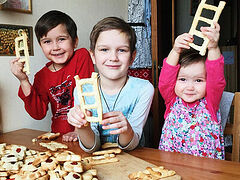Orthodox Christians are going through Great Lent, a time of work on ourselves and our souls. It is called a period of joy and spiritual spring, but it is also associated with many restrictions and bans that help overcome our passions and addictions. Not all adults can pass through the Holy Forty Days properly. Likewise, it is difficult for children to do this. Igor Tikhonovsky, a leading specialist of the Missionary Center of the St. Tikhon’s Orthodox University of Humanities, a father of five children, shares his experience on how to help children make good use of fasting.
—Great Lent is a special time for every family, including children. If everything is more or less clear with adults—an intensified prayer rule and fasting from certain foods—then what should fasting be like for children?
—Let’s start with small children aged under seven. For them it would be more correct to limit the amount of meat on weekdays and give them a little meat on Sundays. I don’t mean breastfed babies, but children aged between four and six. They should have their usual food during Great Lent, but the amount of meat in their daily diet should decrease. As for sweets, it depends. Some families don’t eat sweets all year round. It would be better to switch to natural sweets. For my family nut butters with honey were a true discovery. This is the best choice for Great Lent. It’s a very high-calorie Lenten product, and there are a variety of tastes. A child will be satisfied with glucose and won’t ask for sweets. Thus the transition to fasting food for young children will go almost unnoticed.
—Can they watch cartoons?
—Watching cartoons should be limited. Not forbidden completely, but a child needs to refocus. You can watch Orthodox cartoons, discussing the plot with your child. There are cartoons about saints—for example, on Sts. Basil the Blessed and Seraphim of Sarov. Clearly, fasting is not only about banning everything. The essence of fasting is the benefit for both the body and the soul. Fasting is an ascetic exercise. “Asceticism” translates from Greek as “exercise”. That is, we practice the spiritual life and begin to train our bodies and souls. Every human being has his own measure. The measure of four-to six-year-olds is reorientation. It is necessary to instill love for Orthodox cartoons with meaning in them, talk with them and discuss what they see. In our life we often give directions to our children, speaking in a commanding tone, but we need to communicate and talk with them. We adults share our experience with our little ones.
—It seems that some preparatory period for Great Lent is needed. If a child prays in an Orthodox family, then, of course, he knows about this period. But if not?
—Yes, we always read the prayer of St. Ephraim the Syrian in the morning and in the evening. Maybe your child still doesn’t understand something, but this is a very important spiritual discipline. Fasting and prayer are the workouts that help our souls to be in good shape. But Small children cannot prepare for fasting in advance, as do adults.
As for children aged seven to twelve, they should be prepared a week before Great Lent. We should mentally prepare the child for what will happen and tell him what the restrictions will be. That is, we agree with the child on everything in advance and don’t deprive him of everything in one day.
—If a child is growing up in an Orthodox family, he will know that Great Lent is coming.
—Yes, but for a child this shouldn’t be a sad stage of deprivation so he waits for it all to end. This shouldn’t be for him heavy burdens and grievous to be borne (Mt. 23:4). To prevent this we must prepare the child internally and tell him why we are doing it. Not just because the Church said so and we obey; we should explain why we do this, starting from our personal experience. The child doesn’t care why the priest in church or his neighbor does this—what matters for him is why his parents do it.
—At this age parents still have authority for the child, and he is still guided by their opinions.
—Yes, at between seven and twelve parents are still an authority. There is the desire to be close to each other. There are many developmental successes, including in school, and the parents’ encouragement is very important.
—So, parents who observe the fast by their example help their child go through this?
—Yes, because they do it all together.
—We have to admit that for many adults, Great Lent is seven weeks to endure, although they are supposed to be a time of joy. And you have to convey the right attitude to your child. How can we do it?
—This is a problem of our society and adults in the Church. What meaning do they put into “fasting”? Its understanding as a set of restrictions reminds me of the Old Testament and the Ten Commandments: “don’t do this, don’t do that”—that is, negative morality. And with our help this understanding migrated to fasting, whereas it should be, “observing a fast acceptable and pleasing to the Lord”.
—“Pleasing to the Lord”. We don’t make it pleasant for ourselves. And all this time we go around with a sour look.
—The problem is in our nature, in our body. We want tasty food. At this period both the body and the soul are relaxed. And fasting is a unique time when we have the opportunity to stimulate and invigorate our souls and bodies, making them labor.
—What should be added to or removed from the daily prayer rule for children aged seven to twelve?
—Each family has its own prayer rule. But, in my opinion, it is enough if the prayer of St. Ephraim the Syrian with prostration is added. It must be read according to the rules, not for the sake of formality. For a child this is a serious and unusual situation. If a child in a family prays every day, then he is used to a certain order of the prayer rule. But in Great Lent everything goes beyond the ordinary routine. The child begins to be more involved and comprehend what is happening.
—This is a time of self-determination for a child, and kneeling may be unacceptable.
—No, I don’t think so.
—Of course, if parents do so and children see it, this behavior doesn’t raise any questions. But if a child lives an independent spiritual life, or his parents don’t go to church, it can cause protest.
—If his parents don’t go to church, what prayer rule can we talk about? I will tell you an episode from my childhood. I am from an unbelieving family. At the age of twelve I converted to the faith—the only one from my family. I believed that you need to pray before doing anything. Once my mother asked me to help with the washing—in those days they did it by hand. I always prayed only on my knees (I didn’t understand how one could pray while lying down or standing). I knelt down, started praying… and got it from my parents! I was told that I was only praying and not helping my mother.
—A sad episode. It is good that it didn’t turn you away from the faith.
—Of course, I was worried because I then began to pray secretly from her. While my mother was still asleep I would get up early to read the prayer rule, and no one knew about it. I just want to show you that a child can be separate from his family in terms of faith. Such situations are possible. The question is, how religious is the child and whether he is ready to struggle for his faith. As the Lord said: A man’s foes shall be they of his own household (Mt. 10:36). But why are they enemies? Because if he is a believer and his parents are not, it is very hard and the child is in constant conflict.
—This incindently is a good question: If the parents don’t fast and their child wants to limit himself, should he obey the family routine?
—He is just given food and that’s it. He will not cook for himself separately and he has no money to buy something to eat. There will be a problem of his inner discomfort and worries.
—As for food restrictions for a child’s growing body—is it safe?
—I would recommend limiting him in meat. Not in the sense that you shouldn’t cook him meat broth or soup. Just limit him in all kinds of tasty meat dishes. Fasting is not about limiting oneself in non-fasting food, but in what is hard for us to live without. These are sweets, tasty cold cuts, cheeses, etc. You can give your little one some milk, but not chocolate milk. What your child loves and craves should be limited. You can give him beef or chicken soup, for instance; give him a piece of bread with butter or cheese, but without any additive.
—The point is to stop pampering him.
—Yes, the point is that a child understands that he doesn’t live on bread and water. But it is important for him to abstain from what is of value to him.
As for the 12+ category, here teenagers are already able to understand what fasting is and accept more serious restrictions. In nutritional terms, this is the same as for the seven to twelve age group. Chips, pizzas, sushi and rolls—everything they love should be removed from their diet. Ordinary food with no frills! Motivate your teenage child to give up meat. But take into account your child’s health. I think eating meat on Saturdays and Sundays during Great Lent is okay for him.
—That is, for all age categories of children meat products can be on the table on weekends throughout Great Lent?
—Yes. Ordinary casseroles, boiled meat, but no delicacies.
—But can a child live this rather long period without becoming embittered? The Dormition Fast is quite strict, but short, and you can eat a lot of vegetables and fruit in that season. But during Great Lent the body lacks vitamins, and it is deprived of delicious food and goodies to boot. What can be done so as to avoid a negative attitude in your child?
—The question is what can replace goodies. It can be sweetened nut butters, nuts and dried fruits. A family needs to prepare children for the period of fasting. Explain what you are willing to offer in return. Loads remain, but the diet changes, and it is important to stock up healthy sweets in advance. They meet the needs of the child’s body in terms of vitamins and nutrients. Thus, your child won’t starve and won’t miss anything. Not every family may be ready, and not everyone knows about it. But this is worth taking care of.
—Now let’s move on to the issue of gadgets during Great Lent.
—Indeed, it’s the sorest point for our children. You need to limit social media with parental control to those 12+. Block unwanted apps on your child’s cellphone. I mean browsers, YouTube, and various games. And limit the amount of time he spends on his smartphone. Let him use only the chats he needs to communicate.
—But what if a child tells his parents that he has friends in social media and they deprive him of communication with them?
—They can communicate via WhatsApp and Telegram.
—How can you not upset your child in this situation? It seems that he would sooner live without cake than without a smartphone.
—Clearly, it needs to be talked about, mentally preparing a child for this. I personally can’t give up social media—not because I enjoy them but because this is my work. For many adults this is their work. And it is impossible for me to stop using them out of solidarity with my child. Indeed, it looks as though the children are limited, while the grown-ups use social media. And my children won’t always understand that it’s not my entertainment, but my work. Here, of course, I should warn them a week in advance that this will happen, that the cellphone will remain, but the time of its use will be limited.
Or there is an alternative: to allow him to use a couple of social networks (at least some loophole), and forbid using the other gadgets. Also cut their smartphone time in half: let’s say not four, but two hours a day. It can be done if you cannot stop everything abruptly and your child isn’t very responsive—this is a gentler way. But in any case, we limit something.
—The 12+ age group is very conflictual when a child can show his “ego”, saying that he won’t fast and asking to be left alone. Or he may start fasting, but will realize that he doesn’t have enough willpower and can’t continue to hold out without his favorite games or, say, chips. What should parents do in this case so as not to provoke unnecessary tension?
—There is a wonderful day in the week—Sunday. The first Sunday of Great Lent is the Triumph of Orthodoxy. This is a feast. And if the situation in the family is really difficult, you can promise that something will be allowed on Sunday—for the feast’s sake, and not because it’s hard to hold out without goodies.
—Is it possible to bargain with a child in this case? “Though you don’t want to, let’s get ready for Communion; you will take Communion, and after that we will give you a surprise.” Or is going to church, Communion and prayer not a subject for bargaining?
—In our family we put the question a little differently—not that we will buy our child something for attendance, but we will all go to take Communion together, and then we will all take a walk together and go to an interesting place after church. This could be the motivation. This means that we are going to church together, take pleasure together, and after that we will spend some more time together. There are problems with Communion and going to church with the oldest children, but, nevertheless they still go.
—You shouldn’t miss this moment when you can still talk and negotiate with children. Because then, if the dialogue has not developed over all these years, the child may turn away completely...
—Yes, we need to negotiate and talk every day. Every day our children and us find one or another compromise. Now the child makes a compromise with us, now we meet him halfway. Thus we teach our children to understand the situation, life, family and values. In these conversations mutual understanding is formed. The child may not agree with us now, but in five years he will agree. Our duty as parents is to sow this seed. The question is how we are going to do it. Whether or not it turns out to be chaff depends on the understanding between a parent and a child. Do we do it aggressively, in a directive manner, or lovingly? If we do it with love, we are planting a mustard seed. But if we are aggressive, we sow tares.








